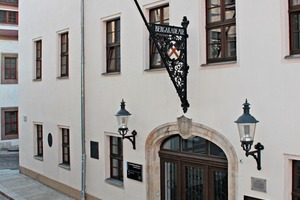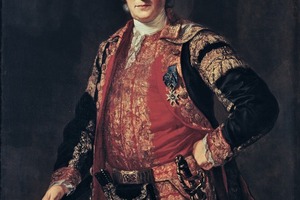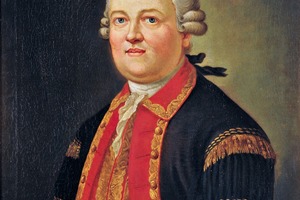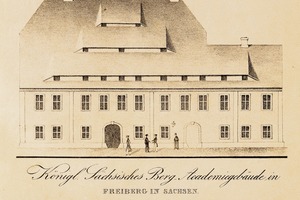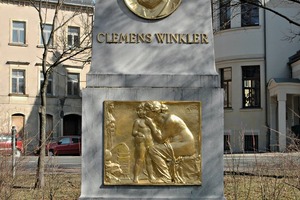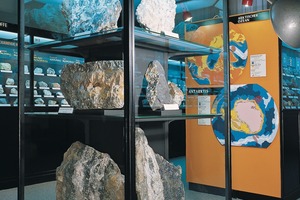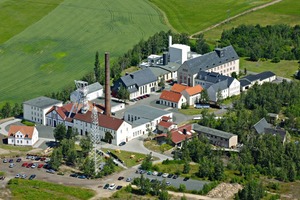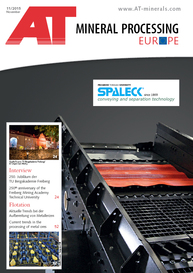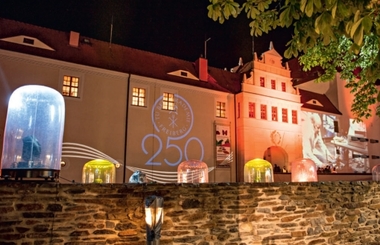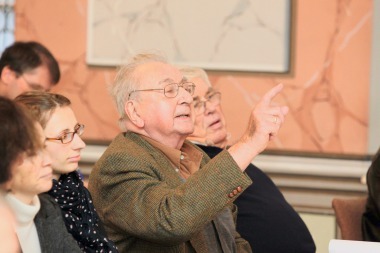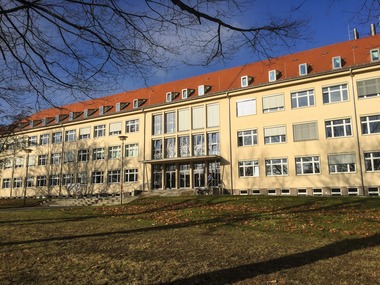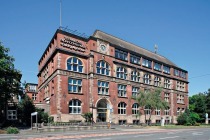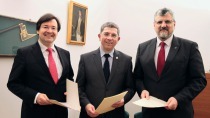The world’s oldest mining and mineral resources academy
The TU Bergakademie Freiberg – The Resources University - celebrates its 250th anniversary in 2015. The academy has, in the course of its long history with its rich fund of tradition, at all times played an important role in the mining and geoengineering sciences, and has generated vital impulses for the development of the geosciences, as well as the other natural and technological sciences.
The high scientific level of the instruction available has motivated students from around the globe to enrol at the Bergakademie Freiberg. The most illustrious include Alexander von Humboldt (1769 - 1859) and Georg Philipp Friedrich von Hardenberg (1772 - 1801; better known as “Novalis”). Distinguished scientists who have studied or taught with success in Freiberg have continuously contributed to the academy’s standing. Among them were Abraham Gottlob Werner (1749 - 1817), the father of modern mineralogy and geology, Clemens Winkler (1839 - 1904), the discoverer of the element germanium, and also Ferdinand Reich (1799 - 1882) and Hieronymus Theodor Richter (1828 - 1898), who were the first to isolate the element indium from Freiberg zinc blende. No less worthy of mention: Julius Ludwig Weisbach (1806 - 1871), polymath and herald of modern engineering methods in the fields of mining machinery, technical mechanics, fluid mechanics, mathematics and mine surveying, Gustav Anton Zeuner (1828 - 1907), a highly gifted organiser in the introduction of new scientific structures and training material for institutions of higher education and postulator of the mechanical theory of heat and engineering thermodynamics, and also Erich Rammler (1901 - 1986), who developed a globally unique high-temperature coking process for distillation of metallurgical coke from lignite. Achievements of lasting and historical value can be recognised only with the benefit of hindsight.
More recent research into university history has now thrown light on the development of the Technical University (TU) Bergakademie Freiberg – The Resources University – in the 20th century, in particular. The founding of the world’s first educational institution for the mining and geological sciences in Saxony’s city of Freiberg in November 1765 was the result both of specific state and general educational policy considerations. The requirements made by the economic and political system of absolutism in the 16th to 18th centuries were of critical importance in the raising of state revenues. This system promoted domestic industrial production and exports, in order to achieve a positive balance of trade and to increase income from abroad, and thus went hand-in-hand with the efforts at reform of educational policy during the Enlightenment, creating an educational institution, the further evolution of which during its now 250-year history was at all times intimately linked to both the economic development of Saxony and of Germany, and to the advancement of German and European education.
The origins, foundation and initial decades of the history of the Bergakademie Freiberg thus took place against the background of reform of the educational system in an absolutist Europe. Even before the foundation of its Bergakademie, Freiberg had earned a reputation extending well beyond the borders of Saxony as a centre of education in mining and resources engineering. Scholars active in mining and metallurgy in Freiberg and Saxony, such as Johann Friedrich Henckel (1678 - 1744) and Christlieb Ehregott Gellert (1715 - 1795) attracted numerous German and foreign nationals interested in initial or further scientific training in the arts of mining and metallurgy to Freiberg, where they received instruction in mineralogy, metallurgy, assaying and analysis, prospecting and mine surveying, mining, mining law and mining accounting. Even in the early 18th century, the economic importance of mining for the state of Saxony, and the accelerated growth in scientific and technical knowledge on the eve of the industrial revolution, gave rise in Saxony to efforts for reform of educational policy in mining and geosciences, efforts which culminated in the establishment of the Bergakademie Freiberg in 1765.
The planning for the foundation of the Bergakademie Freiberg in November 1765 combined the desire for practically orientated occupational training with the concept of basic instruction founded on mathematical and scientific principles to achieve scientifically and technically orientated elite education to meet the technological and economic needs of the mining and resources industry. Under the definitive influence of the Prussian Chief Inspector of Mines and Minister of State, Friedrich Anton von Heynitz (1725 - 1802) and the Freiberg Chief Inspector of Mines Friedrich Wilhelm von Oppel (1720 - 1769), theory and practice in the field of training in mining and resources engineering were combined in an educational institution for the first time anywhere in the world in such a way that no doubts could arise concerning the university status of the new institution. The new mining and engineering academy developed at a rapid pace, becoming a prototype for the foundation of similar institutions throughout Europe. The international reputation of Freiberg’s Bergakademie rose even further following the appointment of Abraham Gottlob Werner (1749 - 1817) as an inspector and lecturer in mineralogy in 1775, in particular. Werner, who had received his academic training at the Bergakademie itself and also at the University of Leipzig, evolved in Freiberg into a scientist, university lecturer and educational reformer of world renown, and subsequently attracted numerous well-known scholars to Freiberg as students, including Alexander von Humboldt (1769 - 1859), Leopold von Buch (1774 - 1853) and Franz Xaver von Baader (1730 - 1806). Not only was Werner to become one of the founding fathers of the modern geosciences, he was also responsible, as an inspector of the Bergakademie, for further modernisation of the institution to meet the changing needs of the approaching age of science and technology.
Under Werner, the Freiberg institution developed into a centre of teaching and research which at the transition from the 18th to the 19th century came to occupy a globally leading position in the sciences and technology, and in the field of mining and minerals, in particular. The Bergakademie Freiberg’s path of development into a technical university for mining and resources engineering, extending over five decades, was shaped not only by organisational but also by content changes. The necessary harmonisation of teaching and research with the development of mining and resources engineering was initiated by the renowned mechanical engineer Gustav Anton Zeuner (1828 - 1907), who was appointed Professor of Mechanics and Mining Machinery Theory and first director of the Bergakademie in 1871. From 1855 on, as a professor, and from 1865 to 1867 also as the director of the Zurich Polytechnic, Zeuner, a student of the Bergakademie, was not only one of the most accomplished mechanical engineers active in technical-university education in Europe, but also one of the most renowned reformers in the various technical disciplines. He was able to consistently make reality of his visions for the development of academic engineering training both as director of the Bergakademie Freiberg (1871 - 1873) and as director of the Dresden Polytechnic. In Freiberg, this meant, in content terms, the integration, above all, of the increasingly important bituminous-coal mining industry and iron-and-steel making into the teaching and research activities of the Bergakademie. Zeuner thus achieved the necessary reorientation of the university around economic and technological developments in mining and resources engineering, thus assuring the existence of the Bergakademie Freiberg into the 20th century.
In the wake of the First World War and post-war political, social and economic problems, the Bergakademie Freiberg lost a large proportion of its status as an international university. As at other universities in Germany, the parliamentary-democratic ideals of the young Weimar Republic failed to gain a foothold. Despite the political and economic vicissitudes of the early decades of the 20th century, the Bergakademie Freiberg was nonetheless able to continue its pre-1900 teaching and research successes. New focuses of teaching and research, such as lignite mining, electrical engineering, geophysics, the science and use of radium, mining economics and mining law were established.
The resumption of teaching and research activities after the Second World War at the Bergakademie Freiberg, one of the few German institutions of higher education not seriously damaged during the war, was definitively shaped after 1945 and 1946 by the new political and economic order in Europe. The largely intact Bergakademie Freiberg and its teaching and research capacities possessed enormous economic and strategic importance from the inception. Post-war reconstruction was possible only with the help of specialists teaching and/or trained at the Bergakademie, in the fields of such important resources as coal, iron, non-ferrous metals, oil, gas and rock salt. For the GDR, the Bergakademie Freiberg attained a status and importance which it would retain right up to the fall of communism in Europe in 1989/1990. The Bergakademie supplied the GDR’s national economy with academically trained specialists in all branches of mining and resources engineering, the minerals industry, the geosciences and also in important sectors of mathematics/computer science, chemistry and geophysics. The “classical” research fields of ore mining, and the winning of coal and iron, were joined by potassium and salt extraction, the exploration of oil and gas deposits, and also by new methods for the preparation, processing and refining of the resources thus obtained for use by East German industry.
With the political turmoil in the GDR, followed by German reunification in 1989/1990, the Bergakademie Freiberg lost its special ranking on the educational landscape of eastern Germany. As at all institutions of higher education in the “new federal states”, radical political and economic change left deep impressions in the structure of the Bergakademie Freiberg. The initiative of reform-orientated forces within the Bergakademie Freiberg itself made it possible to stabilise the situation in Freiberg within an extremely short time, however, and to initiate the steps necessary for the democratisation and reform of teaching and research at the Bergakademie. The change of name to “Technical University Bergakademie Freiberg” and the restructuring of the university into six faculties, for Mathematics and Computer Science, Chemistry and Physics, Geosciences, Geotechnology and Mining, Mechanical Engineering, Process and Energy Engineering, Materials Science and Materials Technology, and for Economic Sciences, took effect on 1 April 1993. Matriculations and student numbers have risen continuously since this restructuring and reform, with a total of more than 5500 persons now studying at the TU Bergakademie Freiberg. The increasing proportion of foreign students, in particular, enabled the TU Bergakademie Freiberg to re-establish its former status as an international venue for university-level study. Numerous partnerships have been set up with universities around the entire globe. This new start and its consistent further development were made possible by the evolution of teaching and research at Freiberg focussing intensely on the fields of materials, energy, geosciences and environment. The TU Bergakademie has established itself as a modern top-rank training institution against European and global competition in university education, both by retaining its classical mining and mineral resources sciences emphasis, and by augmenting it with future-orientated fields of research in materials and semiconductors and with environmental research concentrating on closed materials cycles. The accelerating development of science and the unceasing addition of new knowledge in our 21st century demand from universities and colleges continuous adaptation and reorientation. The securement and sustainable use of the various resources will attain supreme importance for the mining and resources industry.

